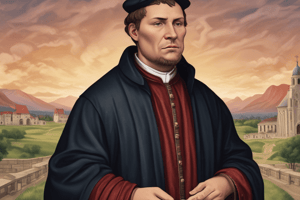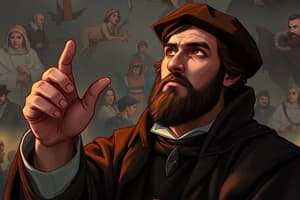Podcast
Questions and Answers
What was the significance of the Church of Wittenberg in Germany?
What was the significance of the Church of Wittenberg in Germany?
- It marked the beginning of the Protestant Reformation
- It housed the Pope during the time of the Reformation
- It was a center of political power for the Roman Catholic Church
- It was built for the king's personal marriage (correct)
Which denominations arose as a result of the Protestant Reformation?
Which denominations arose as a result of the Protestant Reformation?
- Eastern Orthodox, Baptists, Methodists
- Lutherans, Calvinists, Anglicans (correct)
- Jehovah's Witnesses, Seventh-day Adventists, Unitarians
- Presbyterians, Mormons, Pentecostals
How did Luther challenge the Roman Catholic Church?
How did Luther challenge the Roman Catholic Church?
- By criticizing the architecture of churches
- By promoting the authority of the Pope
- By disputing the Church's sale of indulgences (correct)
- By supporting the idea of purgatory
What concept emerged from the Reformation regarding salvation?
What concept emerged from the Reformation regarding salvation?
What impact did the Reformation have on Europeans' reading and writing habits?
What impact did the Reformation have on Europeans' reading and writing habits?
Why did Luther emphasize the 'priesthood of all believers'?
Why did Luther emphasize the 'priesthood of all believers'?
What was the role of Martin Luther's translations of the Bible into German during the Reformation?
What was the role of Martin Luther's translations of the Bible into German during the Reformation?
How did Luther's ideas on indulgences and salvation challenge the Catholic Church?
How did Luther's ideas on indulgences and salvation challenge the Catholic Church?
What impact did Luther's 95 Theses have on society during the Reformation?
What impact did Luther's 95 Theses have on society during the Reformation?
How did Luther's ideas contribute to the Peasants' War in Germany?
How did Luther's ideas contribute to the Peasants' War in Germany?
What was a significant consequence of the split between Catholic and Protestant denominations during the Reformation?
What was a significant consequence of the split between Catholic and Protestant denominations during the Reformation?
How did Luther's use of the printing press contribute to the Protestant Reformation?
How did Luther's use of the printing press contribute to the Protestant Reformation?
Flashcards are hidden until you start studying
Study Notes
- John Green is the host of Crash Course World History.
- The topic is about the Protestant Reformation.
- The Church of Wittenberg in Germany, built by a king for his own marriage, was significant historically, despite personal beliefs.
- The Protestant Reformation led to the creation of various Protestant denominations, such as Lutherans, Calvinists, and Anglicans.
- Prior to the Reformation, all Christians in Europe were Roman Catholic.
- The Reformation disrupted people's perceptions of themselves and the world, leading to increased reading and writing in Europe.
- The Reformation also led to political upheaval, as the Church held significant political power and wealth.
- Luther, a key figure in the Reformation, had a significant impact on the movement and its teachings.
- Luther challenged the Church's sale of indulgences, leading to a public dispute and the posting of his 95 Theses on the door of the Wittenberg church.
- The dispute between Luther and the Church grew, with Luther denouncing the Church's power and challenging the role of priests.
- Luther's teachings spread, leading to the formation of various Protestant denominations and the decline of the Church's power.
- Luther's teachings emphasized faith alone, rather than good works or rituals, as the means of salvation.
- The Reformation also led to the concept of the "priesthood of all believers," as all Christians were seen as equal in the eyes of God.
- The Reformation had a significant impact on the political landscape of Europe, leading to the rise of various Protestant states and the decline of the Holy Roman Empire.- During the period between 1517 and 1526, more than a million copies of Martin Luther's writings were printed, some with books, pamphlets, and illustrations. His ideas spread quickly throughout Europe, resembling modern social media and urban graffiti.
- Luther's translations of the Bible into German allowed common people to read the Scriptures for themselves, instead of relying on Latin texts, which spread rapidly and influenced public discourse.
- The printing press enabled the mass production and dissemination of Luther's teachings, leading to the Protestant Reformation.
- Luther's ideas challenged the Catholic Church, particularly regarding the sale of indulgences and the role of the Church in people's salvation.
- The 95 Theses, a document outlining Luther's criticisms of the Catholic Church, sparked widespread debates and discussions.
- The peasants' revolt of 1524-25, driven by the ideas of Luther and other reformers, sought to address grievances against the nobility and the Church, leading to the Peasants' War in Germany.
- Luther and other reformers advocated for a more personal relationship with God, rejecting the need for the intermediary role of the Church and the payment of indulgences.
- The Peasants' War, though initially successful, was ultimately suppressed with brutal force, killing around 100,000 people.
- The Reformation led to the split between the Catholic and Protestant denominations, with significant impacts on European history and the development of modern Christianity.
- The mass production and dissemination of Luther's works made it possible for people to access and debate religious ideas, leading to the Protestant Reformation and significant changes in European society.
Studying That Suits You
Use AI to generate personalized quizzes and flashcards to suit your learning preferences.




